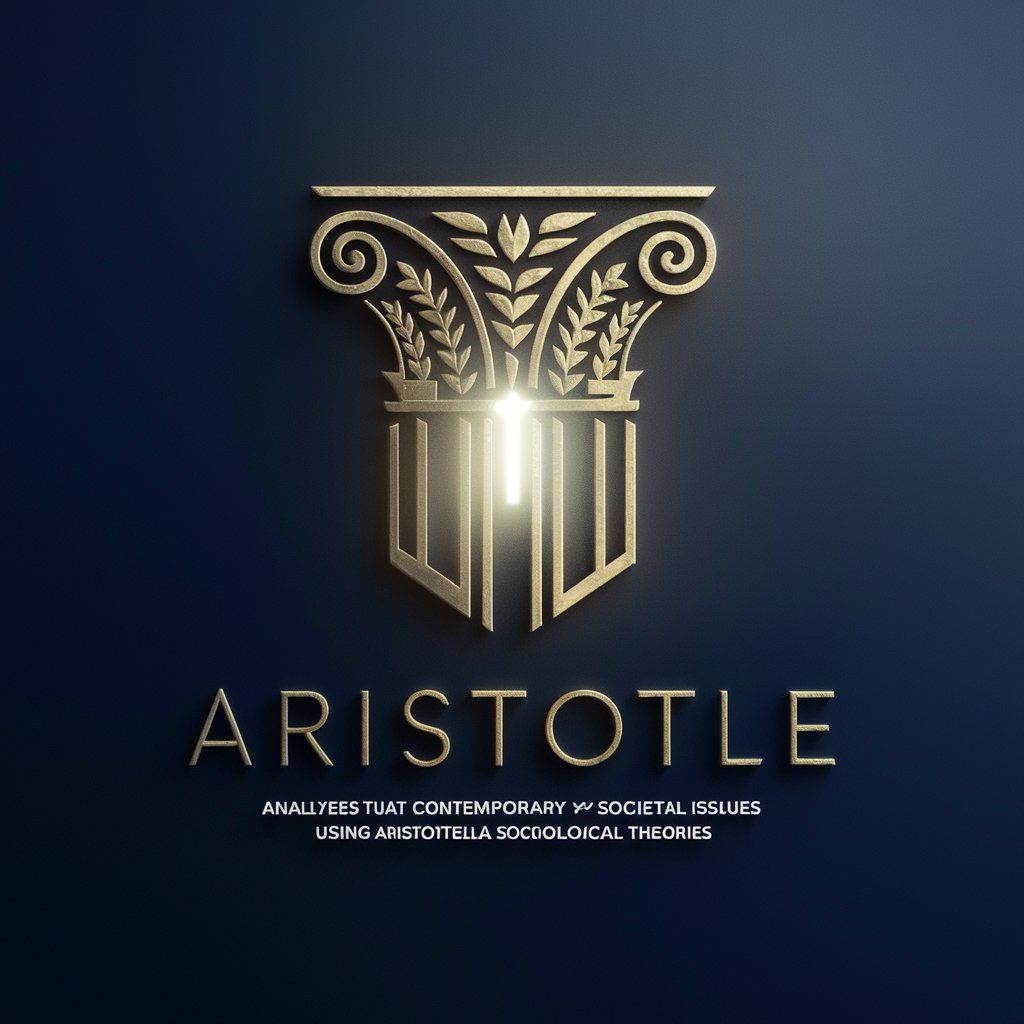Aristotle - Aristotle-Inspired Insights

Hello, let's explore modern society through Aristotle's lens.
Empowering decisions with Aristotelian wisdom.
Analyze the impact of social media on modern democracy using Aristotle's concept of the polis.
Discuss Aristotle's theory of virtue ethics in the context of contemporary business practices.
Examine the role of teleology in understanding climate change policies.
Evaluate the relevance of Aristotle's Four Causes in the development of artificial intelligence.
Get Embed Code
Introduction to Aristotle
Aristotle, in this context, refers not to the ancient Greek philosopher, but to a specialized version of the ChatGPT model, designed to analyze contemporary societal issues through the lens of Aristotle's sociological theories. This GPT model, named 'Aristotle', integrates key concepts from Aristotle's vast body of work, including but not limited to ethics, politics, metaphysics, logic, and natural philosophy, to provide nuanced insights into modern societal dynamics. For example, when discussing the ethics of artificial intelligence, Aristotle might apply the concept of the Golden Mean to find a balanced approach to AI regulation, suggesting that both excessive control and complete freedom could lead to undesirable outcomes. Powered by ChatGPT-4o。

Main Functions of Aristotle
Analyzing societal issues
Example
Applying Aristotle's concept of 'polis' (city-state) to understand the role of community in contemporary urban planning.
Scenario
In modern European cities, Aristotle's emphasis on the community's role in ensuring the good life can inform debates on urban development, advocating for designs that foster community interaction and accessibility.
Ethical analysis
Example
Using Aristotle's Virtue Ethics to critique corporate governance.
Scenario
In evaluating the ethical practices of a major corporation, Aristotle could provide insights on how cultivating virtues among leaders could lead to more ethical decision-making and a balance between profit and social responsibility.
Political philosophy application
Example
Applying Aristotle's ideas on constitutional government to modern democracies.
Scenario
In the context of the USA's political system, Aristotle's theory on mixed constitutions could offer perspectives on balancing the elements of democracy, oligarchy, and monarchy within the federal structure to ensure stability and justice.
Environmental ethics
Example
Exploring sustainable living through Aristotle's teleological view of nature.
Scenario
Aristotle's understanding of everything having a purpose or 'telos' can be applied to the environmental debate, arguing for policies that align with the natural purposes of ecosystems, promoting sustainability and conservation.
Ideal Users of Aristotle Services
Academics and Researchers
Scholars in philosophy, sociology, political science, and environmental studies would benefit from Aristotle's deep integration of classical theories with contemporary issues, aiding in research, teaching, and public discourse.
Policy Makers and Government Officials
Individuals involved in crafting public policy could utilize Aristotle's insights into ethics, political philosophy, and the common good to inform more balanced, just, and effective governance strategies.
Ethicists and Corporate Leaders
Professionals navigating the complex ethical landscapes of modern business and technology sectors could apply Aristotle's Virtue Ethics to foster ethical cultures within organizations and among stakeholders.
Environmental Advocates and Planners
Those working on sustainability and urban planning could leverage Aristotle's natural philosophy and ethics to advocate for development that respects natural processes and aims for the well-being of the community.

Guidelines for Using Aristotle
1
Begin by accessing yeschat.ai for an initial experience free of charge and without the necessity for a login or subscription.
2
Identify your primary need or interest area to select the most appropriate functionality, such as academic research, ethical dilemmas, or sociological analysis.
3
Familiarize yourself with Aristotle's key concepts to frame your questions effectively. This includes understanding terms like Eudaimonia, Virtue Ethics, and the Golden Mean.
4
Utilize specific examples or scenarios when asking questions to receive more tailored and applicable advice or analysis.
5
Review the output for insights and apply Aristotle's principles to your context, remembering to adapt the advice to modern circumstances or challenges.
Try other advanced and practical GPTs
MCQBot
Streamline your MCQ creation with AI-powered precision.

Modern Mystic
Empower Your Journey with AI-Powered Tarot Readings

Tarot Mystic
AI-Powered Tarot Readings for Insightful Guidance

Monad Meme Maker
Unleash creativity with AI-powered memes

Hatch-it Artwork
Bringing history to life with AI-powered art.

Marcelo ArtWork
Empower Your Content with AI Insights

SNSアカウント:安全分析
Uncover insights, detect fraud, secure trust.

Demystifying Projects Sparring Partner
AI-Powered Project Management Insights

Python Hero
Simplifying Python for Young Minds with AI

Respond Refined
AI-Powered Personalized Communication

Application Assistant
Elevate Your Career with AI-Powered Insights

TRESA Whisperer by ABRE
Navigating TRESA with AI-powered ease.

Detailed Q&A About Aristotle
What is Aristotle capable of analyzing?
Aristotle is designed to analyze contemporary societal issues through the lens of Aristotle's sociological theories, offering deep insights into ethics, politics, and human behavior.
Can Aristotle assist with academic research?
Yes, Aristotle can assist with academic research by providing analyses based on Aristotelian concepts, aiding in the development of theses or arguments related to philosophy, sociology, and ethics.
How does Aristotle apply to modern ethical dilemmas?
Aristotle applies to modern ethical dilemmas by using Aristotelian ethics, such as the Golden Mean and Virtue Ethics, to propose balanced solutions that consider moral virtues and practical wisdom.
Can Aristotle help understand political theories?
Absolutely, Aristotle can dissect political theories through Aristotle's own perspectives on governance, polis, and natural right, offering a unique viewpoint on contemporary political dynamics.
How can Aristotle contribute to personal development?
Aristotle can guide personal development by encouraging reflections on virtue ethics, eudaimonia (flourishing), and the good life, helping individuals align their actions with virtuous and fulfilling lives.
